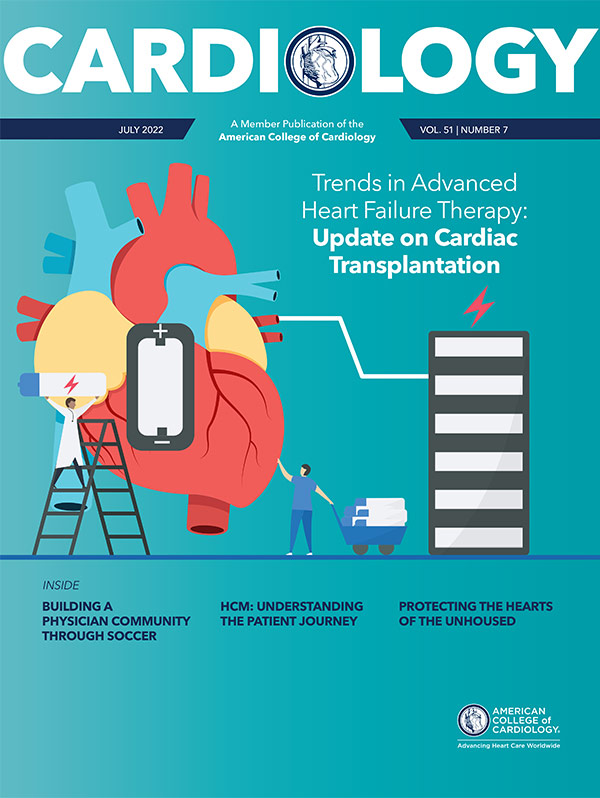Journal Wrap

The hottest research from various peer-reviewed journals – handpicked weekly by the ACC.org Editorial Board led by Kim A. Eagle, MD, MACC.
ACC Participates in ADA Consensus Report Offering HF Guidance in Patients With Diabetes
An American Diabetes Association (ADA) Consensus Report recognizing heart failure (HF) as an "underappreciated complication of diabetes" offers clinical guidance on optimal approaches for screening and diagnosis of HF in people with diabetes or prediabetes. The report, published in Diabetes Care included designated representation from the ACC.
Both Type 1 Diabetes (T1D) and Type 2 Diabetes (T2D) increase an individual's risk of developing HF. Additionally, HF may be the first presentation of cardiovascular disease in many patients with diabetes. Despite these statistics, HF is frequently underdiagnosed. As such, the report, authored by Rodica Pop-Busui, MD, James L. Januzzi, MD, FACC, et al., aims to provide clinicians with algorithms and tools "at a time when choice of interventions is expected to be even more impactful, with requisite thoughtful clinical evaluation and involvement of multidisciplinary care."
Key recommendations from the report include:
- Measurement of a natriuretic peptide or high-sensitivity cardiac troponin on at least a yearly basis to identify possible presence of stage B HF and to prognosticate risk for progression to symptomatic stages of the diagnosis.
- Implementation of individualized management regarding further testing and introduction or avoidance of treatments following abnormal natriuretic peptide or high-sensitivity cardiac troponin results.
- Use of guideline-directed medical therapy (GDMT) similar to patients with HF and without diabetes, including an angiotensin receptor-neprilysin inhibitor (ARNI) (or ACEi/ARB if ARNI is not prescribed), evidence-based beta-blockers, mineralocorticoid receptor antagonists, and SGLT2is.
- Use of metformin, GLP1RA or insulin in individuals with T2D at high risk for/with established HF and for whom additional glycemic control is needed.
- Consideration of diabetes technologies, cardiac rehabilitation programs and weight loss strategies as part of overall efforts to optimize care.
- Ensuring women, individuals with T1D, and those with high-burdened social determinants of health have access to and are offered the same management framework.
In addition to the recommendations, the authors identify several areas where knowledge gaps regarding epidemiology, mechanisms for HF risk, and care and management exist, and where future research could help inform the intersection of diabetes and HF. They also highlight potential opportunities to address equity, diversity and inclusion, whether through identifying sex-specific prevention and treatment approaches or determining how best to implement exercise programs that take into account "the entire spectrum of racially and socioeconomically diverse populations."
"This important document emphasizes the importance of early recognition and thorough treatment of heart failure among individuals with diabetes," said Januzzi, vice chair of the ADA Consensus Document and current ACC Trustee. "With more timely recognition of this high-risk diagnosis comes the opportunity to improve outcomes. The ACC is grateful for the opportunity to work collaboratively with the ADA to improve heart health for those with diabetes."
Does Masked Uncontrolled Hypertension Impact CKD Progression?
A retrospective cohort study of patients with hypertension and nondialysis chronic kidney disease (CKD) found that nighttime masked uncontrolled hypertension (MUCH) was common. Furthermore, it was associated with left ventricular hypertrophy (LVH) and poor renal outcomes. These are among the findings reported in JAMA Network Open.
The study of 675 patients conducted in Shanghai, China found that 38% had MUCH and in 63% of these patients it was isolated nighttime MUCH. Over the median follow-up of 39 months, 130 composite kidney events occurred. In patients with MUCH, the risk for LVH was nearly threefold higher (and this increased to fourfold higher with isolated nighttime MUCH) and the risk of composite outcomes was fourfold higher, compared with controlled hypertension.
These findings reinforce the importance of ambulatory blood pressure monitoring in the management of nighttime hypertension in patients with CKD, writes Debabrata Mukherjee, MD, FACC, on ACC.org. These results also support current guideline recommendations that nighttime blood pressure control should be an important part of hypertension management, especially in Asia.
TEXTMEDS: Text Messages Improve Risk Factors But Not Medication Adherence After ACS
Motivational and supportive weekly text messages had no effect on medication adherence after acute coronary syndrome (ACS) but improvements were seen in lifestyle risk factors, according to a study published in Circulation.
Clara K. Chow, MBBS, PhD, et al., conducted a single-blind, multicenter, randomized controlled trial of patients after ACS to examine the effects of text-message delivered cardiac education and support on medication and healthy lifestyle adherence. The control group received usual care of secondary prevention as determined by the treating clinician. In contrast, the intervention group received multiple customized motivational and supportive text messages on medications and healthy lifestyle tips weekly, with an opportunity for two-way communication via text or telephone.
A total of 1,424 patients (mean age, 58 years; 21% women; 80% White) from 18 Australian public teaching hospitals were included and data were available for 1,379 patients for the primary outcome of self-reported medication adherence defined as >80% adherence to each of the five indicated cardioprotective medications at both six and 12 months.
Results showed no significant difference in the primary endpoint between the intervention and control groups (relative risk [RR], 0.93; 95% confidence interval [CI], 0.84-1.03; p=0.15), and no between-group difference was seen for individual guideline-directed medications, including aspirin, β-blocker, ACE inhibitor/ARB, statin and second antiplatelet. No difference was seen in medication adherence in exploratory analyses using pharmaceutical dispensation data. And no differences were seen in LDL-C and blood pressure control.
However, small effects were seen for lifestyle risk factors in favor of the intervention, with a greater improvement in body mass index <25 kg/m2 (21% vs. 18%; p=0.01) and eating guideline-recommended daily servings of vegetables (9% vs. 5%; p=0.03), and fruit (44% vs. 39%; p=0.01).
The authors note that despite fewer lifestyle-focused texts than medication-adherence texts, the intervention participants were more likely to report adherence to healthy lifestyle practices than medication adherence. They hypothesize that external factors could be part of the reason for the lack of an effect on medication adherence. "These include social and economic factors such as medication costs, patient-doctor relationship, fixed health beliefs, belonging to an ethnic minority, depression, and reduced social support," they write.
In an accompanying editorial comment, Abhinav Sharma, MD, PhD, et al., write, "Overall, the TEXTMEDS trial is an important step in our understanding of how mobile devices can affect health behaviors at scale." They further state the trial raises additional questions that warrant exploration, such as who would be responsible for paying for similar interventions and whether mobile apps and digital devices will further narrow or exacerbate health care disparities.
In a perspective on ACC.org, Elizabeth A. Jackson, MD, FACC, adds, "this trial highlights the difficulty of performing behavioral trials" and that "the authors are to be applauded for a well-designed and well-conducted trial that contributes to our current knowledge of behavioral trials in this population. Targeting patients who most need additional support for pharmacologic adherence and adaptable interventions may be warranted."
Clinical Topics: Acute Coronary Syndromes, Cardiovascular Care Team, Dyslipidemia, Heart Failure and Cardiomyopathies, Prevention, ACS and Cardiac Biomarkers, Lipid Metabolism, Nonstatins, Novel Agents, Statins, Acute Heart Failure, Heart Failure and Cardiac Biomarkers, Exercise
Keywords: ACC Publications, Cardiology Magazine, Acute Coronary Syndrome, Algorithms, Angiotensin Receptor Antagonists, Angiotensin-Converting Enzyme Inhibitors, Aspirin, Blood Pressure, Body Mass Index, Cardiac Rehabilitation, Cardiovascular Diseases, Cholesterol, LDL, Computers, Handheld, Confidence Intervals, Consensus, Control Groups, Cultural Diversity, Depression, Diabetes Mellitus, Diabetes Mellitus, Type 2, Diabetes Mellitus, Type 1, Economic Factors, Exercise Therapy, Fruit, Glycemic Control, Healthcare Disparities, Healthy Lifestyle, Heart Failure, Hospitals, Teaching, Hydroxymethylglutaryl-CoA Reductase Inhibitors, Insulins, Life Style, Medication Adherence, Metformin, Middle Aged, Mineralocorticoid Receptor Antagonists, Minority Groups, Mobile Applications, Natriuretic Peptides, Neprilysin, Pharmaceutical Preparations, Prediabetic State, Receptors, Angiotensin, Risk Factors, Self Report, Single-Blind Method, Social Determinants of Health, Social Support, Text Messaging, Troponin, Trustees, Vegetables, Weight Loss
< Back to Listings


